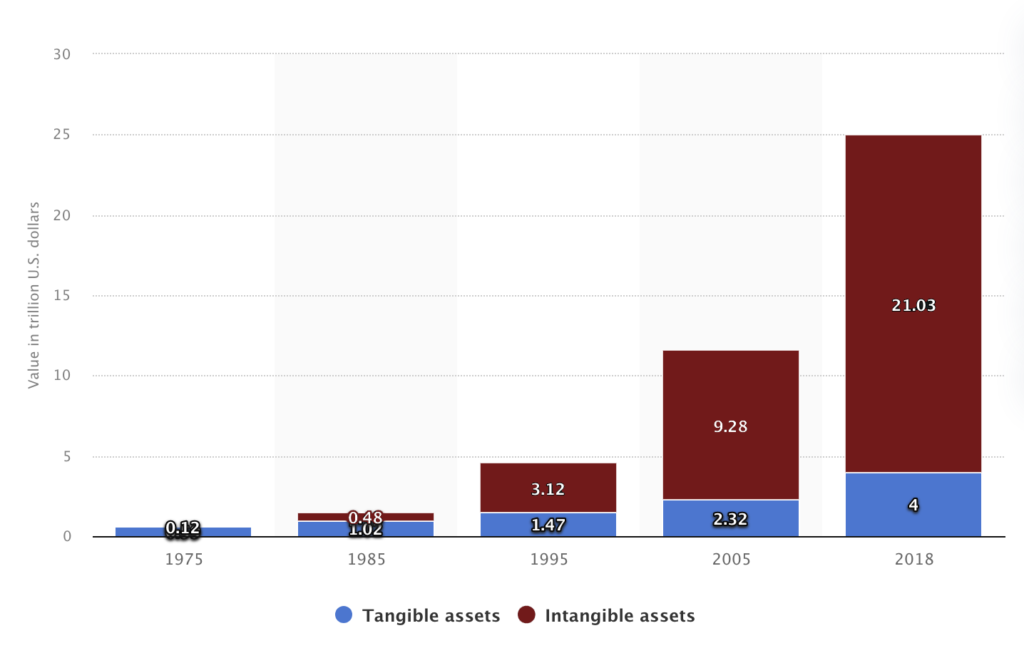
How’s your corporate culture? Have you made it a management priority?
NOTE: The following is an edited excerpt from my 2008 MBA thesis, “Why Do Some Companies Make Caring for Employees a Management Priority?”
A study of “best practice organizations” shows one of the best ways “organizations can create a productive and engaged workforce” is to “recognize employees as assets to be maximized, not expenses to be minimized. In today’s knowledge economy, these organizations recognize the value of their employees and the impact people have on overall business performance. They also understand that their human capital is an intangible asset whose value must be factored into the overall equation for substantial economic success and growth.”1
The Rise of Intangible Assets
As demonstrated in the graph above, intangible assets, of which employee contributions play a major role, are now considered a far greater value than tangible assets — in 2018 intangible assets comprised 84 percent of the value of an organization’s overall assets. This demonstrates a profound shift to a knowledge-worker economy. As such, intangible assets have taken on a much greater significance for investors valuing a company because “in many newer companies, investors are interested more in people or ideas than previous performance.”1
In the past, Southwest Airlines clearly believed so much in the value employees brought to their company that they regarded employees as their number one customer.2 Sadly, this former poster child for corporate culture has wandered from its enviable beginnings.
Other companies, such as Microsoft, go out of their way to make sure employees hired will fit into the already existing culture, and “not necessarily revolutionize it,”3 thus helping assure the contributions are maximized by this intangible asset. Keep in mind that this last point can go both ways. It can help preserve a good or a bad culture. One key to people-centered management is to engage in good hiring practices and hire only those that will fit into a high-performance, caring corporate culture.
Surviving & Thriving in the Business World
Just how important is the corporate culture of a company? Research shows that proactively nurturing a strong, caring corporate culture is vitally important if a company is to survive and thrive in the fiercely competitive business world of today.
If the purpose of a corporation is to make a profit for its shareholders, as Nobel Prize-winning economist Milton Friedman proclaims, then a corporation ought to be very cognizant of its culture because of the influence it can have on the overall success of the company. Investing in the corporate culture, with either executive time and/or company funds, is indirectly in the interest of the shareholders because it has been shown it can increase profits. It’s also important to treat other stakeholders well besides employees because “the manager usually can only generate profits if she treats employees, customers, and suppliers well.”4

In other words, the focus should be on a company’s values, not increasing shareholder value. When you take care of the former, the latter has a far better chance of being realized (providing the values include, of course, an emphasis on caring for employees).
6 Important Stakeholders
Within an organization, six important “groups of stakeholders have been identified: stockholders, employees, customers, managers, suppliers, and the local community.”4 Therefore, the stakeholder theory of R. Edward Freeman stating “managers bear a fiduciary relationship to stakeholders”5 is in line with best business practices.
An ethical principle propagated by Immanuel Kant supports the stakeholder theory: “Every human being is entitled to be treated not merely as a means to the achievement of the ends of others, but as a being valuable in his or her own right, that each person is entitled to be respected as an end in himself or herself.”4
The utilitarian theory, which is “the moral worth of actions or practices is determined by their consequences,”4 is important in this discussion. It’s also been stated the “source of economic success is largely based on a perspective that sees the development of people-based strategies as crucial for long-term economic performance.”5 The research supporting the positive consequences a company can receive for taking care of all of its stakeholders (especially its employees) is numerous.
Yet many companies are still ignoring what is likely their most valuable asset, the employees, by not creating a caring culture designed to show how important they are. At Southwest Airlines, “reaching out to people with kindness and inviting them to be part of the Southwest family are practices now deeply embedded in the company’s culture.”2 It’s difficult for employees to feel personal satisfaction about their work if they do not feel valued. (Again, sadly this is no longer quite the case at Southwest, which has undoubtedly left founder Herb Kellerer rolling in his grave.)
Employee Morale in Decline
When employee satisfaction is low, so is morale. Employee morale, which is “the emotional attachment or sense of engagement a salesperson [or employee] has for his or her job,”6 is closely connected to the strength of a company’s ethics.
Many jobs appear to leave employees unfulfilled. In looking only at statistics on job satisfaction levels, there’s clearly a need to be concerned about how a corporate culture affects employee morale. One study found that only half of all the workers feel satisfied with their jobs.7
The DISENGAGED Employee
According to a study conducted by Gallup, more than half of employees (59%) are quiet quitting (not engaged), and 18% are loud (actively disengaged).8 Something’s clearly wrong here.
Gallop says it “measures and tracks global employee engagement because it has significant linkages to many performance outcomes that organizations care about, including customer loyalty, employee retention and productivity.”
This great disengagement (although there’s nothing really great about it), isn’t anything new. Nearly two decades ago a Harris Interactive survey revealed how satisfied Americans were with their jobs. It states only 20 percent felt passionate about their jobs, 33 percent felt they were employed in a dead-end job, and 21 percent were looking to change their career.9
It’s only logical that employee job satisfaction and morale also have a direct influence upon the quality of customer service, and therefore the degree of customer satisfaction. That’s why noted business consultant Stephen R. Covey says, “always treat your employees exactly as you want them to treat your best customers.”10
Employees: Make Sure Your Values Align
Of course, the onus for job satisfaction does not lie solely with the company. Just as the company should practice good hiring practices to hire employees that are a good match for the position and the company culture, employees also need to be vigilant in seeking a good match. It’s also important that employee values align with corporate values. Even before a job seeker reviews the salary, health coverage, vacation time, and other fringe benefits of an employment offer, he should have already investigated the corporate culture and determined whether or not it’s a fit.
I’ve experienced various levels of job satisfaction and morale with different employers. This satisfaction and morale level — and hence the productivity, passion, commitment, etc. — was largely influenced by the types of corporate cultures and the degree the company demonstrated it cared for its employees.
I may share my experience at these employers in a future newsletter/blog post.

Jeffery E. Pizzino, APR is a spin-free public relations pro who is passionate about telling the why of your story with clarity, impact and authenticity. He began his PR career in 1987 at Ketchum Public Relations in New York City but has spent the majority of his career as a solopreneur. He’s AuthenticityPR’s Chief Authentic Officer and also functions as the fractional CCO for technology startup Converus.
Jeff has an MBA in Management from Western International University and a Bachelor of Arts degree in Communications — with an emphasis in PR — from Brigham Young University. He’s a native of Milwaukee, Wisconsin, but also holds an Italian citizenship. Jeff and his storyteller wife Leticia have four children and four grandchildren. In his extremely limited nonwork hours, he studies italiano, practices guitar, gardens, disc golfs, reads, listens to New Wave music, serves in his church, watches BYU football, and plays Dominion and Seven Wonders. Email Jeff.
- Author unknown. (2006). Listen up employers; employees know what they want this Labor Day. Retrieved July 3, 2008, from http://www.kronos.com/About/pr_LaborDay_aug28.htm
- Freiberg, K. & Freiberg, J. (1996). Nuts! Southwest Airlines crazy recipe for business and personal success. Austin, Texas: Bard Press.
- Schwartz, M. (February 20, 2000). Intangible assets. Computer World. Retrieved June 24 2008, from https://www.computerworld.com/article/1370429/intangible-assets.html
- Beauchamp, T. & Bowie, N. (2003). Ethical Theory and Business. Upper Saddle River, NJ: Prentice Hall.
- Pfeffer , J. (1998). The human equation: Building profits by putting people first. Boston: Harvard Business School Press.
- Smith, B., & Rutigliano, T. (2003). Morale stinks! Retrieved August 28, 2007, from https://www.destinationcrm.com/Articles/ReadArticle.aspx?ArticleID=48156
- Jones, Ph.D., L.K. (n.d.). Job satisfaction. Retrieved August 19, 2007, from http://www.careerkey.org/asp/career_options/job_satisfaction.asp
- Harter, J. Globally. (June 13, 2023). Employees Are More Engaged — and More Stressed. Gallup. Retrieved July 18 2024, from https://www.gallup.com/workplace/506798/globally-employees-engaged-stressed.aspx
- Author unknown. (2005). Job satisfaction statistics. Retrieved August 19, 2007, from https://careervision.org/job-satisfaction-statistics/
- Covey, S. R. (1989). The seven habits of highly effective people. New York: Simon and Schuster.

